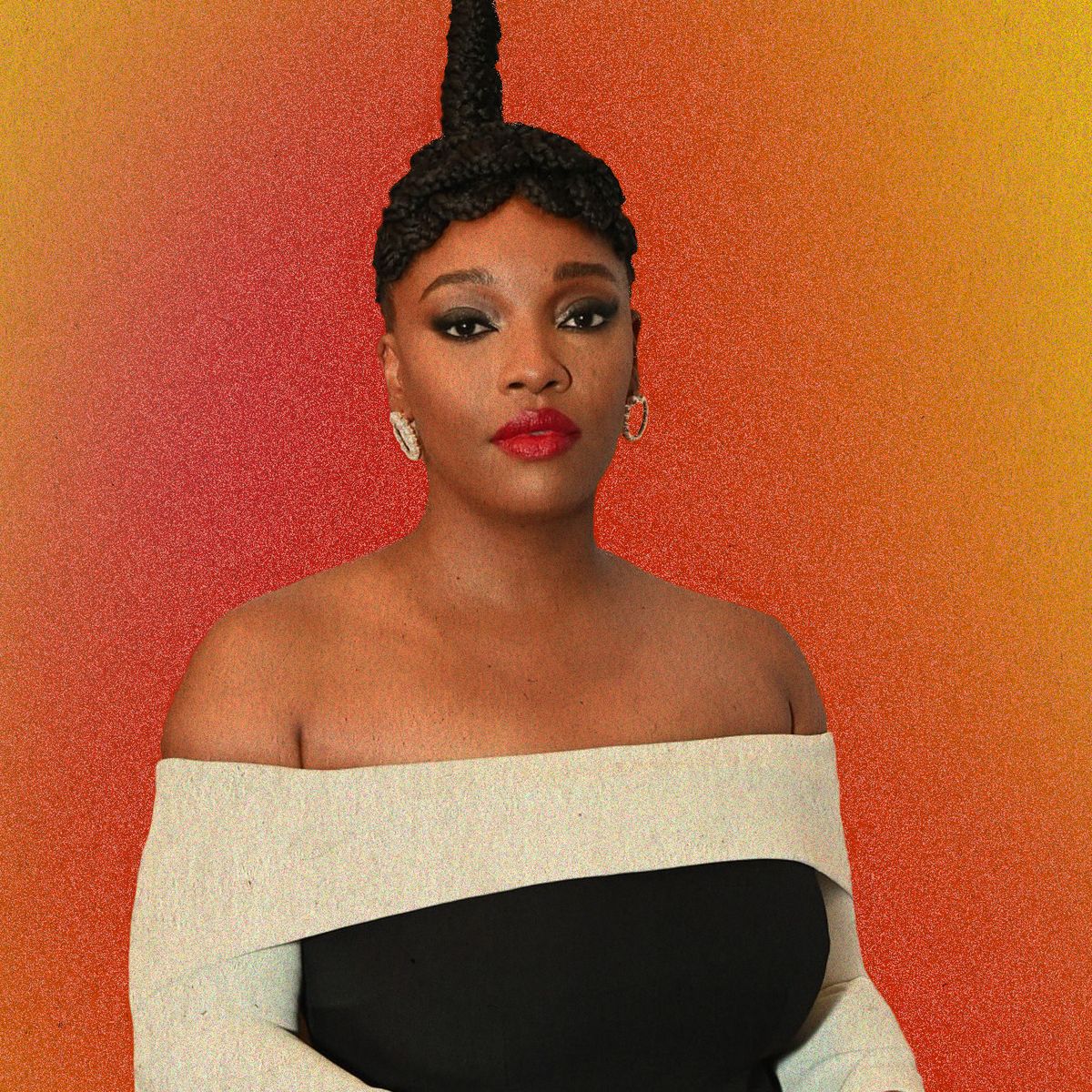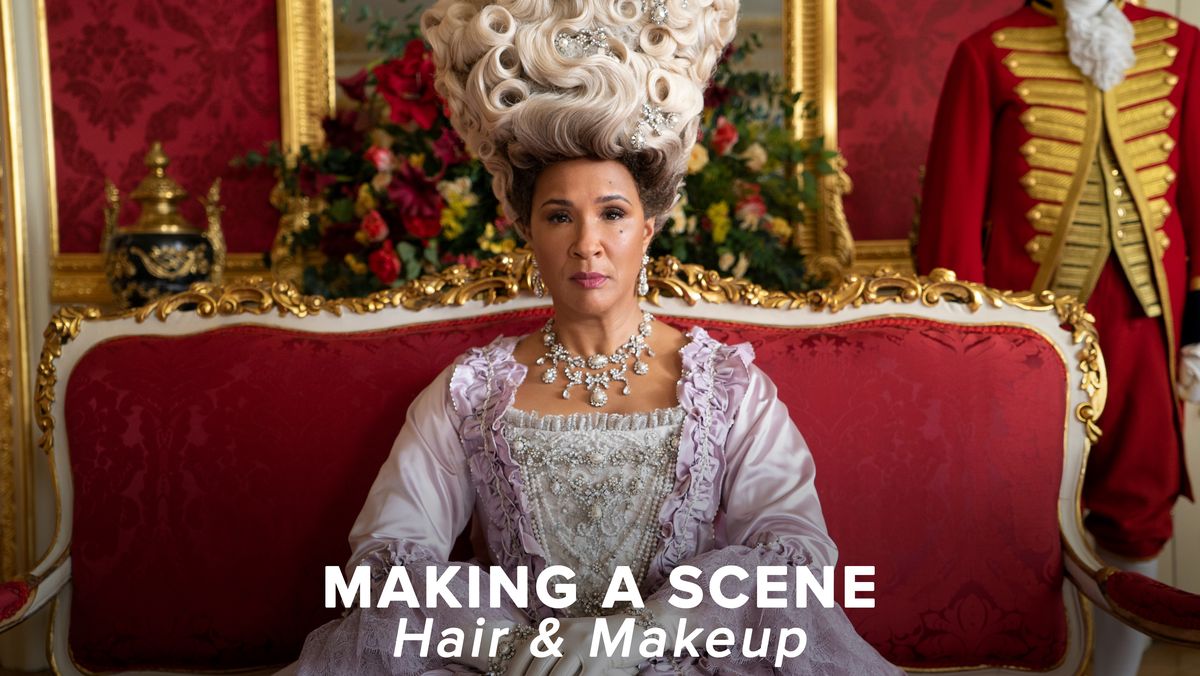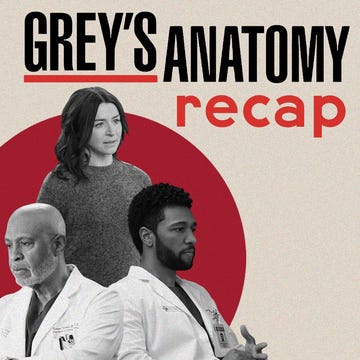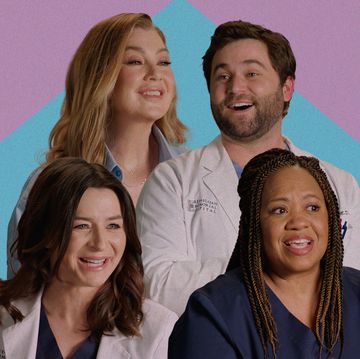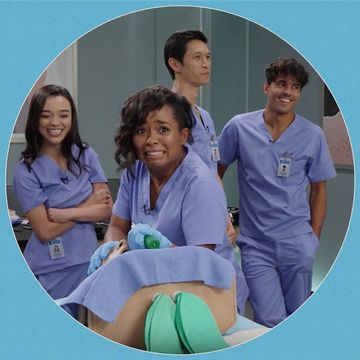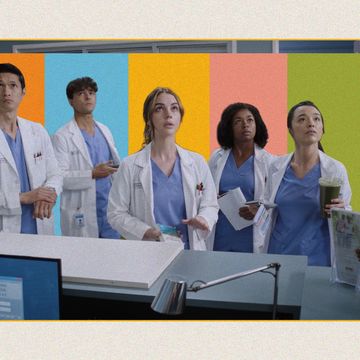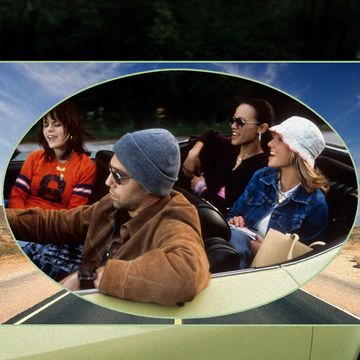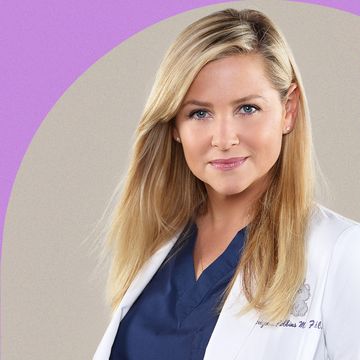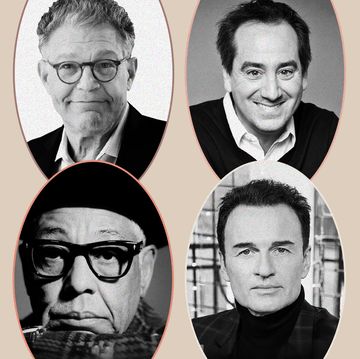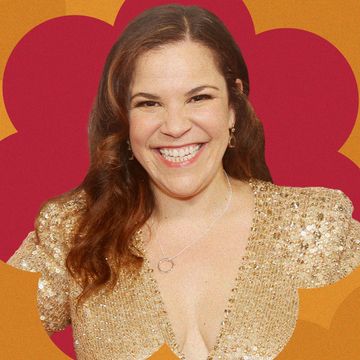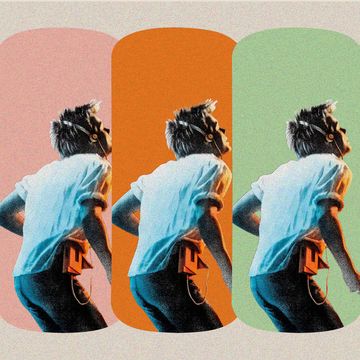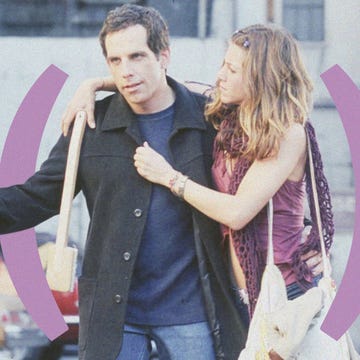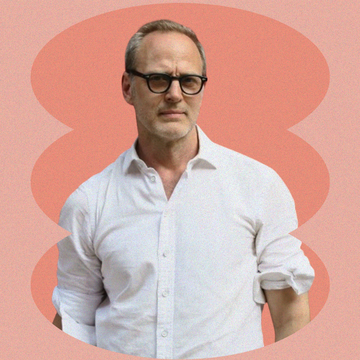In late 2010, Christina Jackson found herself at a read-through rehearsal for Boardwalk Empire. There sat industry stalwarts Steve Buscemi, Kelly Macdonald, Michael Kenneth Williams, Michael Shannon, Michael Pitt, and a dozen others. The popular HBO show was preparing for its second season, while Jackson, for her part, had just graduated high school five years prior. “There was this feeling of ‘This is very big, and I shouldn’t be here’; these are real actors who have been doing this long before I was even thought of,” Jackson tells Shondaland. “But I quickly got over that because I was at this table too, right? And they picked me for a reason.”
That reason, as far as we’re concerned, is talent. It’s why, 12 years later, Jackson is in Variety’s 10 Actors to Watch for 2022. It’s also why, when watching Devotion — J.D. Dillard’s latest film, about U.S. Navy fighter pilot Jesse Brown (Jonathan Majors), who helped gain major ground for the U.S. in the Korean War, the “forgotten war” — a viewer might find the urge to go back to the scenes with Jackson’s Daisy Brown, Jesse’s wife, which pull so strongly. But to hear Jackson tell it, another reason she’s been able to make her mark in great TV and films like Apple TV+’s Swagger and CBS’ The Good Fight, and the upcoming biopic Shirley, starring Regina King as Shirley Chisholm, is serendipity.
The moment that perhaps changed Jackson’s life forever occurred in middle school in Newark, New Jersey, when one day, she, a student who was only allowed to take the stairs, instead jumped into the faculty elevator and found herself face-to-face with a teacher, staring her down.
“Part of me wants to say that it was destiny,” says Jackson of the moment, because “that teacher looked at me and was like, ‘You wanna join the drama club?’ I said, ‘All right. Cool.’” And thus, Jackson’s future was written.
Jackson grew up splitting time between her mother in Newark and father in Plainfield, New Jersey. She didn’t do organized sports or dance, but joining the drama club touched on Jackson’s main interest: books. “I love reading,” she says. “I love storytelling. And plays were something that I didn’t necessarily grow up with, so it was a new frontier for me, not only reading the plays, but deciding, as a group, what we were going to perform and who plays what — that camaraderie and teamwork.”
After middle school, Jackson attended Newark’s Arts High School. Among the alumni of the public magnet school were famous jazz singer Sarah Vaughan, actress Tisha Campbell (Little Shop of Horrors), and Michaela Jaé Rodriguez (Pose). Jackson graduated in 2005 alongside none other than Michael B. Jordan.
Arts High School was where Jackson learned about the history of dramatic arts, Greek mythology, Shakespeare, the classics, and the contemporaries. It’s where she learned that performance was more than just singing and dancing and entertainment, that there was real work and intention behind what the end product reveals. But still, Jackson didn’t think, “I’m going to be an actress; I’m going to turn the world on its ear.” It was more that she did it, she enjoyed it, and things started happening the more that progressed. Just prior to graduation, she signed a contract with a management company in New York City, and though she had to complete her finals and go to prom and graduate first, she started taking auditions immediately after.
“I love the variety, the opportunity to get to play somebody new,” says Jackson. “I love every time I get an audition, and I get to read and decide if this is something that I want to lend my voice, my body, my mind to.”
And this is something that Jackson has become more discerning about in recent years. As the roles for Black women continue to expand, continue to grow beyond the inaccurate monolithic presentations that Hollywood provided for so long to the detriment of not only the actors in the system, but also to those consuming the media, Jackson has been choosing roles that are grounded in love. Ahead of Devotion releasing in theaters worldwide on November 23, Shondaland spoke with Jackson about playing Daisy, her upcoming role as Congresswoman Barbara Lee in Shirley, and the tragedy that befell her family five years ago, which became the catalyst for how Jackson approaches her career.
VALENTINA VALENTINI: Certainly, from the outside, it would seem that Boardwalk Empire was your big break. Tell us about landing that role.
CHRISTINA JACKSON: I’d never been to Atlantic City before, but just by chance I went with my friends, and while there we saw the promos and posters, and I was like, “What is this?” I Googled it, and I saw that it was going to be a period piece that was taking place in New Jersey for HBO. That’s a huge deal. But I didn’t have HBO, so I had to go to a friend’s house to binge-watch. I was in love.
I’d done a screen test for One Life to Live, and I didn’t necessarily want to be on soaps, but I just thought that it could teach me how to work quicker, be on my feet. But I didn’t get it, and I was a little sad about that. Then a week later, I got an audition for Boardwalk Empire season two, and it was like, “Okay, now hold on now.” I pin-curled my hair up, I found a silk blouse and pearls, and I went on the audition. But everybody was dressed in period for this audition; everybody took this seriously. We all knew how big of a deal it was. I got a callback, and it was on St. Patrick’s Day, and there’s a lot that happens in the streets of New York on St. Patrick’s Day. But I braved out into the world, I did my audition, and on my way back home, my manager called me to tell me HBO sent over an offer. I wanted to scream so loud, but you can’t do that on a packed train.
VV: You’ve said that you’re becoming more selective about scripts that you lend your abilities to. What do you mean by that, precisely?
CJ: In the last 10 years, there’s more work becoming available to Black actresses. There’s variety, and it’s showing that we’re not a monolith. But also, you’re told to audition for everything that comes along, and what sticks, sticks. I’ve been selective in the past, but also there were a lot of times that I was auditioning for things where it was like, women don’t talk like this, or the role was for “open ethnicity,” but when I take this role on, I’m approaching this as a Black woman, and these things don’t work. You get told that if you get the role, you can maybe have a conversation with the writer, but these were things that I’ve always been very conscious of. Now, after being told to just audition for any and everything, there comes that realization that, no, I can’t play everything, and I’m not going to make myself feel bad when something comes along and it just doesn’t feel right. Because I’m not afraid of hard work, of doing whatever it’ll take to tell the story. But there’s so much that goes into putting a character up on its feet. We are vessels; we are conduits. If somebody dies in the script and I need to mourn that person, my body doesn’t know I’m faking. So, I reserve the right to be more selective and to feel safe and comfortable in the process of me putting these characters up on their feet.
VV: Devotion is obviously centered around the story of Jesse Brown and the pilots he served with, but I’ll be honest: I was sad there wasn’t more of you in it. You feel like there is a lot going on with her that could be explored in the film.
CJ: J.D. and I, and Jonathan and I, we had these conversations. The script came to J.D. already done. There were tweaks that happened, but it was pretty much the story that they decided they were able to tell [based on Adam Makos’ 2015 book Devotion: An Epic Story of Heroism, Friendship, and Sacrifice]. Because we’re not getting to watch Jesse and Daisy fall in love, we’re coming into this very specific time that is happening in their lives. They’re also trying to tell the story of Tom [Hudner, played by Glen Powell] and of the Korean War and the Fighting 32s. The way that Daisy’s scenes are spaced out, they’re strategic, but there is this feeling that you don’t get much time. I’ve reconciled that because it’s also mirroring real life — they didn’t have enough time together. He didn’t see her enough. You want to be truthful and honest with the performance. Even in the short amount of time that we had to film Daisy’s scenes, every time I was with Jonathan, I just wanted to break down into tears [as Daisy] because I knew that this man was going to leave, and there was a possibility that he wasn’t going to come back. That is what she experienced in real life, so it was important to me to be able to show that Daisy is not seen as Suzy Homemaker when Jesse’s not around. I’m not one of those people who feels like I should be proud for whatever it is that I’m getting, but to be able to be a part of this story, I’ll take it.
VV: In Swagger, you’re also in the role of “wife.” You play Tonya Edwards, wife of the show’s lead protagonist, Ike (O’Shea Jackson Jr.). Is this another “the woman behind the man” storyline for you?
CJ: The acting coach (for the teenagers) on Swagger is also a mentor to Jonathan, and it was funny because I met her on Swagger and then booked Devotion, and that’s when I found out she was his mentor, and she calls me a professional cuddler. She says that I make my male co-stars look so good. She’s like, “You’re so soft and loving and warm and inviting.” And you know what? I’ll take that. I am now on my third wife in a year — I did a pilot where I was also a wife — but these three women are so different, and I play women who are not just wives, but they are fervently loved by the men in their lives. It’s not something you see a lot with women in general who are married, but specifically Black women. So, it’s one of those things where I’ll take playing a wife, but the bar needs to be high for me to take another one.
VV: And there’s nothing wrong with playing a wife, or “the wife,” but it is curious that you’re getting these types of roles back-to-back. Though Barbara Lee is certainly not a “wife” role.
CJ: I’ll say this. There was a traumatic event that happened in my life five years ago — my brother passed away. And you know, you take life for granted — you leave the house; you swear you’re coming back. As an actor, you feel like you’re so emotionally intelligent that you know what everything feels like and you can mimic, but grief was something that knocked me off-kilter. It took a lot out of me. I took almost two years off, in which not only my little brother passed, but my grandmother and my stepfather passed away too, and then there was the pandemic.
VV: I am so sorry for your losses. That sounds like an incredibly tough year.
CJ: I learned a lot in that time; I learned that time isn’t linear. Two years is a very long time, but it felt like weeks or months. That was scary to me because I was losing time with the people around me who were still there. Once I made that realization, it was like, I can’t sit here and take this for granted. When I was ready to go back to work, I specifically prayed to go back into projects that were grounded in love. But all of us are changed on the other side of 2020. If you say you aren’t changed, you’re lying. For me, it’s showing up in my performances, because when you’ve lost so much, you kind of get brave; there’s nothing else to lose when I’m in those moments.
VV: How is that translating to you playing Barbara Lee, who is still living and serving as a congresswoman in California. We know because the movie doesn’t have a release date yet that you can’t say much, but what can you tell us about Shirley?
CJ: Well, I received the audition, I sent the tape in, and they emailed me back and told me that [director] John Ridley and the producers wanted to have a work session with me. I know that Shirley was a lot for John to get up on its feet and keep up, but he’s someone that I really do enjoy. I love his laugh. I love the way that he jokes around. I could tell from the Zoom meeting that this was something that was very special to him. And I could tell that Barbara Lee’s story was very important too, because this is the first time that people are being introduced to her as a young person.
When they offered me the role, I lost my s--t because I knew I was about to have scenes with Academy Award-winner Regina King. When I met her, I told Regina that I was very nervous because Barbara is such an important figure currently but also to Shirley’s campaign. And Regina was like, “I’m nervous too!” That was good to hear that it wasn’t just me.
In the film, we’re meeting Barbara as a college student affiliated with the Black Panther Party, then becoming a mother, and she is watching the world change in real time in 1972. She wants to be a part of what could be the first Black woman running for president. I remember what it felt like watching Obama. I cannot imagine what it must have felt like back then, to come out of [the assassinations of] Malcolm, Martin, Medgar [Evers], JFK, to come out of wars, to come out of all of that and to hear Shirley Chisholm talk about feminism and intersectionality. But for as smart as she was, as capable as she was, it still came down to gender and sex and the way that the men of the time understood it.
After I booked it, I immediately went and watched some of Shirley’s speeches and her debates, and I immediately understood why Barbara pushed everything around and made sure to help in whatever way she could. I’ve met Barbara, and to see the way that she still lights up when she thinks about Shirley and how important her legacy and her memory is to her was amazing.
VV: So, beyond Devotion and Swagger and Shirley, what can we expect from you?
CJ: I hope — fingers crossed — I get a comedy. I need a comedy real bad.
This interview was edited and condensed for clarity and length.
Valentina Valentini is a London-based entertainment, travel, and food writer and is also a senior contributor to Shondaland. Elsewhere, she has written for Vanity Fair, Vulture, Variety, Thrillist, Heated, and The Washington Post. Her personal essays can be read in the Los Angeles Times and Longreads, and her tangents and general complaints can be seen on Twitter at @ByValentinaV.
Get Shondaland directly in your inbox: SUBSCRIBE TODAY
